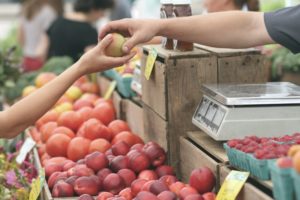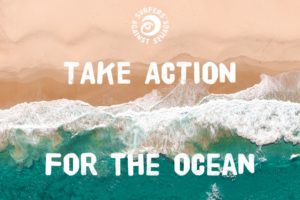The Plastic Free Foundation based in Western Australia launched Plastic Free July in 2011. Since then the award-winning campaign has grown into a global movement, with 250 million participants in 170 countries across the globe last year. The month is dedicated to encouraging businesses and individuals to change their behaviour and shun single-use plastics long term.
The damaging impact of single-use plastic has been well documented over recent years. Sir David Attenborough narrated BBC’s Blue Planet II in 2017 and shone a light on the horrendous consequences that result from our disposal of plastics. This pollution injures and entraps sea creatures and is often consumed by them causing microplastics to enter the food chain. These minute plastic fragments are then consumed by us when we eat seafood.
Much plastic pollution comes from household and commercial waste. This blows from bins and landfill sites into natural habitats, or escapes to riverbeds through the drain as microplastic fibres. We have compiled a list of seven things you can do this Plastic Free July and beyond to minimise your single-use plastic waste.
1. Be Prepared
Despite the bag charge that is now in place at all major supermarkets, globally we are still using 5 trillion plastic bags a year and less than 1% of those are recycled. For most people forgetfulness and convenience mean bags-for-life are regularly abandoned when out shopping. To avoid using plastic carrier bags, be prepared. Make sure you always have reusable bags handy by stashing them in your car, coat or handbag. Apply the same attitude to reusable straws, coffee cups and water bottles to save money and the planet.
2. Say No
Most of the things we order online come with some kind of disposable plastic packaging, but nowadays many companies will give you the opportunity to ditch unnecessary waste. Look for supermarkets who offer bag-free delivery and restaurants who use plastic-free containers and cutlery. Many takeaways will allow you to take your own containers for them to fill. Some clothing brands are becoming more environmentally aware these days too. It pays to do some research and find those who offer plastic-free packaging (like Zara). Or give you the option to choose less packaging for your order (Amazon), or use reusable packaging (John Lewis and Partners).
3. Choose Local
A seemingly unavoidable source of single-use plastic for many people comes with your supermarket shop. A large portion of products at major supermarkets use plastic packaging for convenience, but most of these are not recyclable. To avoid filling your house with unnecessary wrappers, visit your local farm shop as often as possible for fresh produce. Not only will your food be plastic-free, you will also be supporting your local community. Signing up for the milkman will also help to reduce your plastic footprint. Although this may sound like an old-fashioned service, websites like Milk & More search for a milkman in your area who will deliver your glass bottles as regularly as you like. Some will even bring a selection of other local produce as part of the service!

Choose retailers who don’t rely on unnecessary plastic
4. Join a Clean Up
Clean up days happen regularly all over the world. Generally they are organised events where volunteers descend on rural, urban and coastal areas to pick up litter en masse. Not only do these events physically remove the plastic pollution from the environment, they also start important conversations amongst volunteers and witnesses who see the damage their waste can cause. To find a clean up near you, head to the Keep Britain Tidy website. If you are keen to do a beach clean up specifically, organisers like Surfers Against Sewage, The National Trust and the Marine Conservation Society have regular events that you can get involved in… you could even organise your own!
5. Be Ruthless
The most difficult part of cutting out single-use plastic is eliminating things that are convenient or enjoyable. Every time you buy the lunchtime deal from your local supermarket the drink, sandwich and snack bar will come in plastic packaging that is not recyclable. The convenience of grabbing a snack on the go is great, but we don’t see that purchases lasting impact. Instead, plan ahead and pack homemade lunches whenever possible, using sustainable lunch boxes or wraps. Cutting out things we crave might be more difficult, but homemade treats are just as delicious without the waste. You can even make your own fizzy drinks!
6. Support Charities
There are a huge variety of charities working to reduce the impact of plastic waste. Surfers Against Sewage (SAS) was born in Cornwall and is fighting plastic pollution by organising beach cleans and education programmes within schools and campaigning for government action. You can support SAS by signing their petitions, volunteering, donating, buying merchandise or joining one of their many campaigns. Plastic Oceans, Kids Against Plastic (founded by 16 and 14-year-old sisters) and City to Sea are just a few of the other UK-based charities who are fighting to stop plastic pollution.

You can support charities like Surfers Against Sewage in many ways
7. Be Proactive
If you read through 1 to 6 why not be proactive and do some research about what alternatives you could prioritise and where to get them? To calculate your personal plastic footprint, Earthwatch Europe have created a questionnaire to help you understand how your lifestyle is impacting the environment. Your results will give you tailored suggestions to reduce your plastic waste.
Do you feel inspired to cut your single-use plastic waste for Plastic Free July? Check out plastic-free shops online like Zero Waste Club, Plastic Free Pantry and Wearth to help you get started!
I WILL BE ETERNALLY GRATEFUL. AMANDA MAKES YOU FEEL LIKE YOU ARE HER ONLY CLIENT AND HOLDS YOUR HAND TO GUIDE YOU THROUGH














